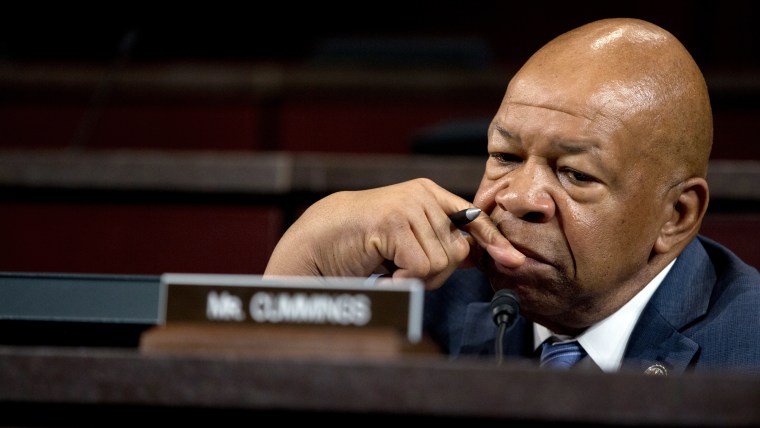Last weekend, Donald Trump sparked international outrage with racist attacks targeting four Democratic congresswomen of color. This weekend, the president engaged in an eerily similar offensive, this time targeting a different Democratic lawmaker of color.
President Donald Trump came under fire Saturday for tweets suggesting living conditions in Baltimore are "far worse" than they are along the southern border, where migrants have lined up to seek asylum.The president lashed out against House Oversight Committee Chairman Rep. Elijah Cummings, D-Md., by calling his Baltimore district "dangerous" and "disgusting."
Alas, that was just the start of the multi-day rant. Trump went on to describe the Maryland Democrat as "a brutal bully," whose district is "a disgusting, rat and rodent infested mess." The Republican added, in reference to the Baltimore-area congressional district, "No human being would want to live there."
It was hard not to wonder what a comment like that said of Trump's impression of the city's residents, most of whom are African American, and their humanity. (Those same Americans aren't just Cummings' constituents; they're also Trump's, since he is still the president.)
As part of the same Trump Twitter tantrum, the president went on to suggest that there's been some kind of corruption involved in funds for Baltimore, adding, "How much is stolen? Investigate this corrupt mess immediately!"
The more Trump's latest racist tirade sparked criticism, the more the Republican returned to the subject. He spent a second day condemning Cummings and his district yesterday -- Trump referred to the respected committee chairman as, among other things, a "racist" -- and then returned to the subject again this morning.
As is often the case, it's hard to know where to start. With the irony of Trump calling someone a "bully" and a "racist"? With Jared Kushner's controversial holdings in the Baltimore area? With the fact that Trump's wrong about Cummings' district? With the fact that Trump couldn't spell the congressman's name right? With the simple observation that U.S. House members aren't responsible for running local governments? With the apparent fact that all of this was inspired by Trump catching a segment on Fox News?
With the stunning hypocrisy of Trump spending so much energy condemning those he perceives as critics of the United States, only to turn around and express his disgust for one of the country's oldest and largest cities?
With the fact that Trump, once again, has presented himself as being president of the United States, but only the parts he likes?
Perhaps it's the pattern that hurts the most. In early 2017, on the weekend in which Americans recognize Martin Luther King Day, Trump condemned Rep. John Lewis (D-Ga.) -- who marched alongside MLK -- before going after his congressional district as an area that's "falling apart" and "crime infested."
The characterizations weren't true, but the Republican looked at Lewis, saw the color of his skin, and made ugly assumptions about the communities Lewis represents.
More recently, Trump saw four Democratic congresswomen of color and made similar assumptions about their national origins. Now, evidently, it's Elijah Cummings' turn.
To see the pattern as accidental would be a naïve mistake. What we're witnessing is the execution of a political strategy -- a clumsy one, to be sure, hatched by a president who struggles to think things through, but a strategy nonetheless.
As we discussed last week, Trump operates from the assumption that the key to electoral victory is maximizing racial resentments and reaping the benefits of some Americans' worst and most divisive instincts. In effect, the president sees value in ripping the country apart, confident that he and people like him will be left with the biggest chunk.
